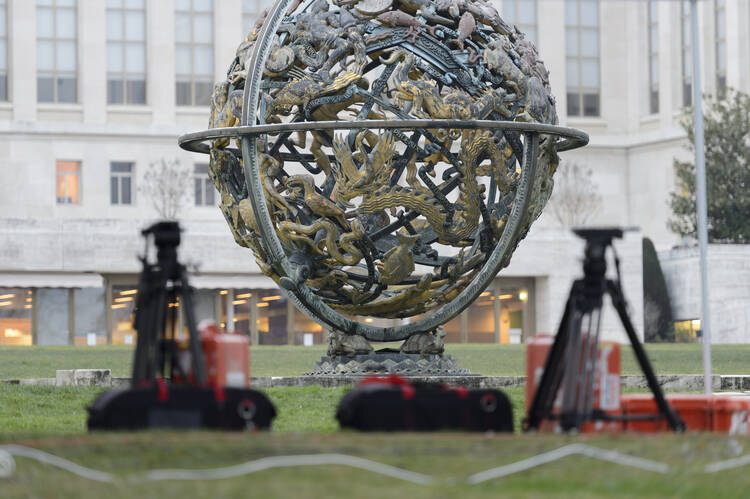Indirect peace talks aimed at resolving Syria's five-year conflict began Friday at the U.N. headquarters in Geneva, without the participation of the main opposition group.
The talks are the first since two rounds of negotiations collapsed in 2014. Syria's conflict has killed more than 250,000 people, displaced millions and sent hundreds of thousands as refugees to Europe.
The first meeting was between the U.N. Special Envoy to Syria Staffan de Mistura and a government delegation headed by the country's ambassador to the U.N., Bashar Ja'afari. A U.N. spokesman said that de Mistura would later meet with other delegates, including civil society representatives.
The main opposition delegation has said it will not participate in the talks without an end to the bombardment of civilians by Russian and government forces and a lifting of sieges in rebel-held areas.
The meetings are part of a process outlined in a U.N. resolution last month that envisages an 18-month timetable for a political transition in Syria, including the drafting of a new constitution and elections.
The opposition boycott is a blow to the U.N.'s attempt to bring representatives of President Bashar Assad's government and his opponents together for the first time in two years.
Disputes are ongoing over which opposition parties will attend, with the main opposition group — known as the Higher Negotiating Committee, or HNC— coming under criticism for including the militant Army of Islam group, which controls wide areas near the Syrian capital, Damascus, and is considered a terrorist organization by the Syrian government and Russia.
Earlier on Friday, U.N. spokesman Ahmad Fawzi reflected the sense of chaos and confusion surrounding the beginning of peace negotiations when he told reporters at a briefing that "I don't have a time, I don't have the exact location, and I can't tell you anything about the delegation."
Ahmad Ramadan, a senior official with the Syrian National Coalition, which is part of the HNC, said the opposition will boycott the talks until it receives assurances on the implementation of U.N. Security Council resolutions on lifting the sieges and halting bombardment of civilians in Syria.
"There cannot be any negotiations as long as the humanitarian issues have not been discussed or implemented," he said.
Ramadan said that de Mistura sent a letter on Thursday to the head of the HNC, Riad Hijab, which was deemed unsatisfactory. He and another opposition figure, Khaled Nasser, said the U.N. envoy wrote that the opposition's demands were reasonable and that humanitarian issues should be "above negotiations," but that he was powerless to implement them himself, adding that negotiations were the best way to force everyone to implement those resolutions.
Basma Kodmani, a member of the opposition's negotiating team, said the HNC is now studying whether their delegation will come to Geneva to raise these concerns with the U.N. officials or stay in Saudi Arabia where they can raise them from a distance.
In Syria, the official Tishrin newspaper boasted that the no-show by the Saudi and Turkey-backed opposition in Geneva "reflects the collective flight of terrorist groups backed by Saudi Arabia and Turkey from the political table, following their collapses on the battlefield."
Turkish President Recep Tayyip Erdogan said that the moderate opposition was not attending the talks because Russia continues to bomb opposition-held areas in Syria, and that it is a "betrayal" to the moderate opposition to ask them to attend without a cease-fire.
A Western diplomat in close contact with the SNC said in Geneva that the HNC's "main message to us has been, 'while we are under sustained attack by Russia and the regime and other states and militants and other groups we cannot justify to Syrians why we are going.'"
"We tell them the reason to come here is not to hand the Assad regime a propaganda victory," said the diplomat, who spoke on condition of anonymity because he was not authorized to speak on behalf of the opposition.
Opposition figures from outside the HNC are in Geneva, but they were invited as advisers. The HNC is supposed to be the main opposition group in the talks.
But a leading Syrian opposition figure who is not part of the HNC and is currently in Geneva hinted that his team will be part of the talks as a second opposition delegation.
"The presence of three delegations expresses the will of the (U.N.) Security Council who called for a delegation representing all parties of the opposition," former Syrian deputy prime minister, Qadri Jamil, said in an interview with The Associated Press.
Jamil added that in their talks with the government the priority will be to allow aid into besieged areas and that all Syrians unite to "fight the terrorism represented by Nusra and Daesh." He was referring to al-Qaida's branch in Syria known as the Nusra Front and using an Arabic acronym to refer to the Islamic State group.
De Mistura said Thursday that Geneva peace talks are "an opportunity not to be missed."
___
Associated Press writers Zeina Karam in Beirut and Suzan Fraser in Ankara contributed to this report.
Copyright 2016 The Associated Press. All rights reserved. This material may not be published, broadcast, rewritten or redistributed.








